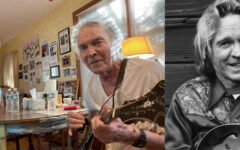
Amanda Gore is a multi-tasking individual, but given her devotion to bluegrass and all it entails, she clearly wouldn’t have it any other way. So too, the fact that she’s funneled that enthusiasm from an early age, still provides all the motivation she needs.
Born and raised in Tallapoosa Georgia, Gore began playing guitar at age ten, and from that point on, she picked up a variety of other instruments as well. That led her to start her own band nine years ago at the tender age of 13— Amanda Gore and The Red, White & Bluegrass. The group currently consists of Gore herself on guitar, Robby Houston on guitar, Joe Reece on banjo, Craig Payne playing upright bass, and Jeff Partridge on mandolin.
“My band means the absolute world to me,” Gore says. “It keeps me busy doing simply what I love.” That also includes her role as South Eastern Regional Director of an organization called Tomorrow’s Bluegrass Stars, which she’s been affiliated with since age fifteen. She recently was named its South Eastern Regional Director, which finds her primary responsibility promoting bluegrass, particularly to a new generation of younger people.
In addition, for the past seven years, she’s been involved in booking bands, organizing festivals, and other special events. Among the artists she’s worked with are Edgar Loudermilk, Larry Sparks, and Ralph Stanley II at a local music venue called The Outpost Music Barn in Waco, Georgia.
“I’ve always loved music since I was a small child,” she insists. “It comes natural to me. My grandparents had a band for 25 years. After my grandfather passed, I decided to do what I knew would make him proud, and that was to play bluegrass.”
Given that backstory, it’s little wonder that bluegrass has been so intrinsically infused in her soul. “I simply grew up in it,” she recalls. “It holds a special place in my heart.”
She mentions Rhonda Vincent & The Rage and Alison Krauss & Union Station as among her other influences.
Amanda Gore and The Red, White & Bluegrass perform primarily in west Georgia and east Alabama area for the past nine years, although they’ve yet to record an album. Nevertheless, Gore says she has a number of few original songs that she would like to share.
“Playing bluegrass with my family and friends means the world to me,” she maintains. “There is simply no other feeling like it. It can certainly make you smile and be happy, even on your darkest days. I pray God will allow me to play it for the rest of my life, and allow me to do and perform it to the best of my abilities. My bluegrass music is the very best part of me!”
Having said that, it’s hardly surprising that Gore opted to pursue those possibilities even further after she was offered the aforementioned job with Tomorrow’s Bluegrass Stars, and then made friends with one of the organization’s principals, John Colburn.
“We’ve been buddies since day one,” she relates. “He’s a one-of-a-kind friend, and we have put our heads together for more ideas than I can count. When John approached me with the offer of becoming South Eastern Regional Director, I was thrilled, but I was mostly honored. My main duties are to look out for the kids in my region. I try my best to get them involved with festivals in this area. I want them to be in a safe environment, have fun, jam, and potentially to perform stage shows. I have a good many responsibilities as South Eastern Regional Director, but a few of the main ones are developing relationships with other promoters, communicating with the other directors and officers, and finding the best festivals for our youngsters to attend.”
Her entry into the promotion industry came about due to similar circumstances. When she was 15, The Outpost asked her to help with bookings, and a year later, she was given full time responsibilities. “I’ve been involved with The Outpost for about seven years now,” she explains. “I’ve hosted festivals twice a year in the spring and fall, I do weekend jams and shows, as well as special events.”
Clearly then, her dedication to the music remains intact. It also gives her certain insights into why bluegrass continues to flourish worldwide.
“Its roots run deep,” she muses. “Back in the day, people had nothing else to do but gather together and play music. In 1929, Bill Monroe left home to play music with his brothers. In the 1940s, he met Earl Scruggs, who had come up with a unique style of banjo playing. Bill hired him on the spot. Later they became Bill Monroe & the Blue Grass Boys. After that, bluegrass took off like wild fire. No one had ever heard anything like it, and the people loved it. Since then, the bluegrass music world has grown tremendously and became more popular all over the world.”
A young person with an old soul, Amanda Gore is dedicated to ensuring that bluegrass will always beckon.







